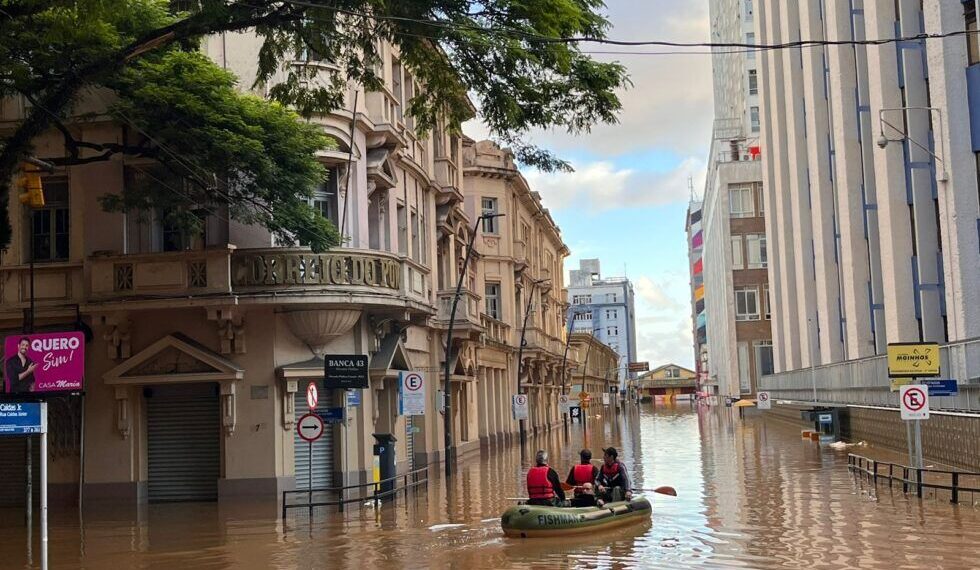Several vehicles in the state had to adapt to the tragedy
Newspapers in Rio Grande do Sul had to adapt due to the biggest flood ever recorded in the state. The outlets expanded coverage, reinforced digital editions and released paywalls.
The National Association of Newspapers (AJN) reported that several outlets in the state are having difficulties printing and delivering physical versions, such as Diário Popular, in Pelotas. “We haven’t been printing since the 6th, when the RBS graphics park was forced to stop its services”, says the company’s executive director, Régis Martin Nogueira. “We have many flooded areas here in Pelotas, in the South Zone, due to the flooding of Lagoa dos Patos. We would not have access to deliver newspapers”, he adds.
Jornal do Povo, from Cachoeira do Sul, reported losses, as the printing center runs another 25 periodicals from the western border, the southern zone and the central region of the state. “To print newspapers to other cities, not only equipment and operating structure are needed, but also very special delivery logistics to guarantee the publication of the newspaper early in the morning in the respective cities”, explains Eladio Dios Vieira da Cunha, director of Jornal do People. The newspaper continues to be printed with normal circulation until supplies of paper, plates and ink last. “We were stranded until Friday (10). Now a route to Porto Alegre has opened, but the journey increases from the normal 196 kilometers to 550 kilometers”, adds the executive.
Gazeta do Sul, from Santa Cruz do Sul, due to geography, found an alternative path. “We continue to print our daily newspaper and others from cities with access to ours. We also started to print, temporarily, newspapers that are not able to run on RBS, in Porto Alegre, as is the case of Diário de Santa Maria”, says André Luís Jungblut , CEO of the newspaper. Gazeta do Sul has been distributed normally in the city, but has encountered problems circulating within the municipality.
The A Hora group, from Lajeado, in the Taquari Valley, was hit hard by the floods. “We have been without printing our diary, A Hora, for 15 days, which goes to 48 cities in the Taquari Valley, and some even outside this area, because we do not have the logistical possibility of delivery to more than 50% of the locations”, he says Adair Weiss, the company’s executive director. According to the executive, another concern is with the newspaper’s employees. “We have the problem of our delivery people, they cannot enter streets full of mud, it is a very big danger and, therefore, we prefer to do the edition only online until now”.
While the resumption of printing and distribution of the newspaper is not possible, the A Hora group has strengthened the radio programming (102.9) and the online portal, but is still facing difficulties. “We spent 12 days without electricity, running on our own generators to keep the radio station on the air and our production units for the portal”, explains Weiss.
The newspaper’s editorial staff is also making efforts to keep the population informed. “We had colleagues who lost their homes, who slept at friends’ houses and shelters. In the midst of so much chaos, we maintained our serenity and provided all possible services. At times we became an extension of civil defense, as nothing could be more important to us than recovering the lives and hope of our people”, laments the journalist.
Jornal do Comércio, in Porto Alegre, did not have its facilities flooded and, therefore, was able to maintain circulation of the printed edition every day. At the same time, a task force was set up between the editorial offices to provide real-time coverage for the portal, in addition to providing access to all content about the floods for non-subscribers. “With the engagement of the entire newsroom – which, just like the population of Porto Alegre is not immune to the adversities of this historic flood –, we are managing to check the veracity of much of the information that is circulating, in addition to guaranteeing service provision regarding water supply, by example, public utility information and more in-depth and analytical content”, says Guilherme Kolling, editor-in-chief of the daily.
In the city of Porto Alegre, the newspapers most affected are Zero Hora and Correio do Povo, according to AJN. Vehicles had printing parks flooded and newsrooms had to evacuate. Grupo Sinos, from Novo Hamburgo, is available to print copies of Zero Hora and Pioneiro, from Caxias do Sul, while the RBS graphics park remains out of operation.






